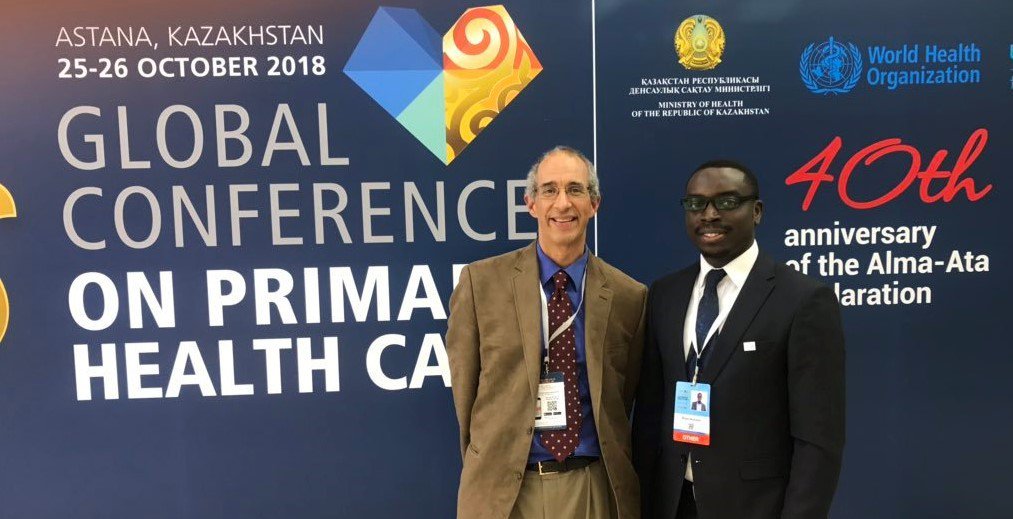As both an advocate and a dad, 2019 is shaping up to be a big year for me! I welcomed my second daughter at the beginning of this year. I also joined the Civil Society Engagement Mechanism (CSEM) of the Universal Health Coverage (UHC) 2030 platform, which is organizing civil society organizations to provide input into milestones throughout 2019. All our work is building toward a major moment: the High-Level Meeting on UHC during the United Nations General Assembly (UNGA), planned for September 2019.
That’s a lot of acronyms, but what it means is that I have the honor of sitting beside advocates around the world working to ensure that everyone, no matter where they live, has access to high-quality, affordable health services.
In advocacy and in parenting, milestones are a big part of the job. They’re moments that signal progress and get photographed and shared. But often, it is between the milestones that the real work happens.
Much progress has been made to date on the road to universal health coverage, dating back to the Alma-Ata Declaration in 1978, which mobilized advocates around health as a human right. While we have made strides since then in strengthening health systems and advancing access to high-quality health services, there is recognition that much of that progress has not been shared by the most remote and vulnerable populations around the world. Half of the world’s population still cannot obtain essential health services, and approximately 100 million people a year are pushed into extreme poverty by health costs. Five million people die each year from accessing poor quality health services.

Brian Atuhaire (right) with David Bishai, health economist at Johns Hopkins University, during the Global Conference on Primary Health Care in Astana, Kazakhstan in October 2018. Photo: PATH/Brian Atuhaire.
In 2015, the world committed to achieving universal health coverage by 2030 as part of the Sustainable Development Goals. Under the umbrella of that large global goal, world leaders met in 2018 in Astana, Kazakhstan, to redouble efforts to strengthen primary health care (PHC), which experts and political leaders agree is the essential foundation toward achieving UHC. I had the pleasure of watching as world leaders issued a major new declaration for PHC. Since then, we have also seen countries like my own, Uganda, making major commitments to UHC—and we anticipate more to come.
These key milestones, both past and future, are important in marking our progress toward UHC. But we need to move quickly from milestone moments to action.
At PATH, we believe UHC starts with people-centered PHC—meaning health systems that put people first, address diverse health needs, and leave no one behind. We need to re-imagine PHC to ensure it is truly people-driven. Here are just a few examples of how PATH is supporting individuals, communities, and governments that envision PHC as community-driven, information rich, and powered by innovation:
- Community-driven. In Uganda, PATH and partners have successfully trained and empowered local civil society organizations and citizen advocates to identify and articulate barriers to accessing quality health services and products—from absentee health workers to illegal user fees to medicine stockouts—and engage their community “duty bearers” to achieve solutions. Community-led advocacy and social accountability is often the missing ingredient for advancing UHC, and is just as critical as the physical infrastructure of clinics, medicines, and supply chains.
- Information rich. People have access to more information about health than ever before, but in order to advance the mission of health for all we need to make sure PHC systems are using that information to drive better decision-making. Digital innovation can strengthen PHC, but only if it enables leaders to take data-led action. In order to overcome decades of small-scale implementations, programmatic isolation, and piecemeal approaches, a unified vision for digital transformation is needed. Thankfully, many governments and partners are beginning to come together to define common needs and build integrated digital health systems—further highlighting the importance of policy. PATH is proud to partner with countries like Tanzania who are leading these efforts.
- Powered by innovation. Because equity is our mission, innovation means ensuring lifesaving tools and medicines get to the people that need them most. One key factor in improving access is ensuring health products move efficiently through the review process. While regulatory approval processes are necessary, they are often disparate and inefficient, resulting in delays for lifesaving health products. In a PATH report, we model the potential impact—measured in lives saved—of efforts to harmonize regulatory approvals for health products across countries in Africa. By accelerating the timeline for registration and scale-up of just two emerging medicines by two years, we find that more than 23,000 lives could be saved in Eastern and Southern Africa. Imagine the possibilities.
As I anticipate the milestones ahead for my daughter—rolling over, sitting up, taking her first steps—I am also anticipating the milestones ahead for UHC. I hope to see strong commitments coming from leaders at the World Health Assembly. I expect UHC to be a priority of the government of Japan as they chair the 2019 Group of 20 meeting. And I look forward to seeing global leaders commit to actionable and specific targets in the political declaration of the High-Level Meeting in September.
All of us—governments, international partners, civil society, and businesses alike—must work hand-in-hand to leverage this milestone year to accelerate progress. Together, we can ensure all people will be able to obtain the quality health services they need and deserve, no matter where they live.
Author Brian Atuhaire is PATH’s Immunization and Advocacy Manager based in Kampala. He sits on the Civil Society Engagement Mechanism for UHC2030 (CSEM) Advisory Group and the PHC Strategy Group.
